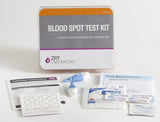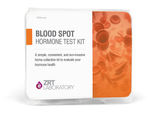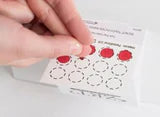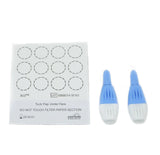Female Hormone Test (Complete Profile) is for accurately assessing the following six essential hormones:
1- Estradiol (Estrogen) (E2),
2- Progesterone (Pg),
3- Testosterone (T),
4- DHEAS (DS),
5- Follicle Stimulating Hormone (FSH),
6- Luteinising(LH) in blood.
Test Result: You will receive your test result 3-5 working days after the laboratory receives your sample. You will see your hormone levels in graphics and numbers on your test result. You will also see laboratory comments by Hormone Specialist PhD Dr in the comments: you will find Dr analysis of your hormone levels and what to do next.
- Collect samples from the comfort of your home and post them to our lab.
- The test must be used within 12 months after the purchase date.
- The test kit includes a laboratory fee: no additional laboratory cost and tax.
- Customers are responsible for shipping their samples to the laboratory.
- Click the link to see the Sample Test Result Report in Blood Spot
The Female Hormone Blood test can tell you whether a hormonal imbalance or thyroid problem may be causing your symptoms. This test can also uncover whether a hormonal imbalance affects your fertility. This test can also allow you to track your hormone levels and understand how they change over time. Tracking your hormone levels over time can also tell you whether your hormone levels are decreasing with age.
Having too much or too little of a particular hormone in the body can cause hormonal imbalance. The main symptoms related to the above-named hormones are:
Estradiol (Estrogen) Hormone imbalance symptoms are
- Bloating
- Acne or oily skin
- Low libido
- Hot flashes
- Irritability
- Depression
- Decreased fertility
- Mood swings
- Obstructed bile secretion or function
- Vaginal dryness
- Poor concentration
- Memory lapses.
Progesterone Hormone imbalance symptoms are
- Heavy or painful periods
- Irregular periods
- Mood swings
- Hot flashes
- Tender or fibrocystic breasts
- Urinary incontinence
- Vaginal dryness
Testosterone hormone imbalance symptoms are
- Decrease in muscles / few distinctive muscles
- Fat deposits in the stomach and breast areas
- Cellulite
- Varicose veins
- Slack arms and face
- Wrinkle development
- Dry skin
- Decreased hair growth
- Low stamina
- Consistent tiredness
- Low assertiveness
- Uncertainty
- Decreased stress resistance
- Nervousness
- Anxiety
- Depressive moods and forgetfulness
Testosterone deficiency can affect women as well as men.
DHEAS deficiency symptoms are
- Acne
- Oily skin
- Fatigue
- Bad memory
- Muscle weakness
- Hirsutism
- Skin & eyes dryness
- Insulin resistance
- Addison's disease
- (PCOS)
- Low stamina
- Low Libido
- Less muscle mass
- Less hair growth in underarms
- Inability to lose weight
What is DHEAS (DS)?
DHEAS (DS) (dehydroepiandrosterone) is an endogenous hormone secreted by the adrenal gland. DHEA-S can produce various hormones like estrogen, progesterone, cortisone, and testosterone. While maintaining regular exercise increases the production of DHEA-S levels in the body, this level also tends to decrease as people age time, particularly after age 30. People with anorexia, end-stage kidney disease, type 2 diabetes (non-insulin-dependent diabetes), AIDS, adrenal insufficiency, and those critically ill are believed to have low DHEA-S levels.
FSH Test for Women
An FSH test is a simple blood test. Women might be asked to have this test done at a specific point in their menstrual cycle, usually the first couple of days. In women, the most common reasons for the follicle-stimulating hormone (FSH) test include:
- Assessing infertility problems
- Assessing irregular menstrual cycles
- Diagnosing disorders of the pituitary gland or diseases involving the ovaries
FSH Test for Men
In men, a follicle-stimulating hormone (FSH) test may be done to:
- Evaluate a low sperm count
- Assess hypogonadism or gonadal failure
- Assess testicular dysfunction
FSH Test for Children
An FSH test might determine if a child is experiencing precocious puberty, which is early puberty. An FSH test may also determine if a child is experiencing delayed puberty. This occurs when sexual features or organs don't develop when they should.
High FSH Levels
High FSH Levels in Women
If you're a woman with high FSH levels, this may indicate:
- A loss of ovarian function, or ovarian failure
- Menopause
- Polycystic ovarian syndrome is when a woman's hormones are out of balance, causing ovarian cysts.
- A chromosomal abnormality, such as Turner's syndrome, occurs when part or all of one of a woman's X chromosomes is missing.
High FSH Levels in Men
If you're a man with high FSH values, this may indicate:
- Klinefelter's syndrome, which is a rare condition in men caused by an extra X chromosome that can affect male development
- Testicles that are absent or not functioning properly
- Testicles that have been damaged by a disease such as alcohol dependence
- testicles that have been damaged by treatments such as X-rays or chemotherapy
High FSH levels in children may mean that puberty is about to start.
Low FSH values may indicate that:
- A woman isn't producing eggs
- A man isn't producing sperm
- The hypothalamus or pituitary gland, the hormone control centre in the brain, isn't functioning properly.
- A tumour interferes with the brain's ability to control the production of FSH.
Luteinizing hormone (LH), a glycoprotein hormone produced by the anterior pituitary, is essential for reproduction in both men and women.
In women, controlled by a negative feedback loop involving several ovarian hormones, gonadotropin-releasing hormone (GnRH) is secreted in pulses from the hypothalamus, stimulating LH production from the pituitary gland. In a normal menstrual cycle, a surge of LH production lasting around 48 hours occurs at the end of the follicular phase. This sudden burst of LH causes luteinization of the ovarian follicles and triggers ovulation.
In men, LH acts on the Leydig cells of the testes to stimulate the production of testosterone, which is necessary for sexual function and spermatogenesis. LH levels are helpful for the clinical assessment of infertility: low levels in men can result in hypogonadism and insufficient sperm production, while in women, LH levels are used to determine the occurrence of ovulation for couples trying to conceive. High LH levels are seen in polycystic ovarian syndrome and in precocious puberty, levels are similar to those seen in reproductive-age individuals instead of the lower levels normally seen in children.
LH levels can also be used in diagnosing pathologies of the hypothalamus or pituitary. As women enter menopause, LH levels rise as ovarian hormone production declines, reducing the negative feedback on GnRH production. LH testing can help evaluate a woman's menopausal status. Ranges for blood spot LH in premenopausal women (luteal phase) are 0.5—12.8 U/ L, in premenopausal women (follicular phase) 1.6—9.3 U/L, in postmenopausal women 15—64 U/L, and men 1.0—8.4 U/L
This Blood Spot hormone test is safe and has easy step-by-step instructions. Due to its producing valid and reliable results, this testing kit helps eliminate any recurring doubts and fears about what you feel—a simple step of collecting your sample and sending it to us. Once the laboratory obtains your results, you will receive your test result between 3-5 working days via email.











